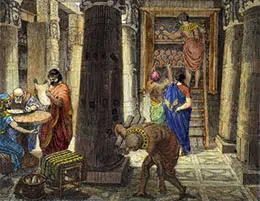 The Greek word pámphilos , which can be translated as “kind” , derived in the Latin proper name Pamphĭlus . The notion reached our language as pánfilo (or Pánfilo , with an initial capital letter, in the case of the proper name).
The Greek word pámphilos , which can be translated as “kind” , derived in the Latin proper name Pamphĭlus . The notion reached our language as pánfilo (or Pánfilo , with an initial capital letter, in the case of the proper name).
The term is used as an adjective to refer to someone who is naive, clumsy or foolish . A fool, in this context, has difficulty understanding basic concepts or tends to act in an irrational or erroneous manner.
For example: “I don't want to work with that idiot anymore, I always have to fix his mistakes ” , “Don't be a idiot and call your girlfriend because she must be worried” , “This teacher is a idiot who knows less than the students” .
Calling someone a fool is therefore derogatory . This word refers to their naivety or idiocy.
Pamphilus , on the other hand, is a character from Greek mythology. A descendant of Aegimius , he was the monarch of the Dorians. When his father died, he was in charge of dividing the kingdom with his brother Dimas and with Hylas ( Aegimius ' adopted son).
The Dorians are one of the four tribes that existed in ancient Greece, and had a very distinctive history, which we can appreciate by studying their traditions, their social organization and their language. Geographically, they were located at the base of the mountain range known as Pindus , in the Greek mountain range of Epirus.
King Pamphilus joined forces with the Heraclids, the sons of Heracles and his own descendants, to invade the Peloponnese , a Greek peninsula connected to the mainland by the Isthmus of Corinth. He shared his final moments with the Heraclids, as he and his brother lost their lives in battle. The tribe called Sicyon , whose inhabitants were the Sicyonans, considered him their mythical ancestor.
Beyond the mythological, we find various historical figures who bear the name of Pamphilus . Among them we can name Pamphilus of Amphipolis (a Macedonian painter who lived in the 4th century BC ), Pamphilus of Alexandria (a 1st century grammarian), Pamphilus Sasso (Italian writer and philosopher of the Renaissance ), Pamphilus de Narváez (Spanish explorer of the time of the Conquest ) and Pamphilus Natera (Mexican military man of the 20th century ).
 The painter Pamphilus of Amphipolis directed the school in the city of Sicyon, mentioned above. He was trained by Eupompos , who had founded the school, although history tells us that his legacy was much greater. Although we do not know many of his works, we do know that he did much for painting by teaching other people, including Pausias, Apelles and Melanthius . On the other hand, Alexander the Great himself had him as his personal painter.
The painter Pamphilus of Amphipolis directed the school in the city of Sicyon, mentioned above. He was trained by Eupompos , who had founded the school, although history tells us that his legacy was much greater. Although we do not know many of his works, we do know that he did much for painting by teaching other people, including Pausias, Apelles and Melanthius . On the other hand, Alexander the Great himself had him as his personal painter.
Pamphilus of Alexandria, for his part, belonged to the school of Aristarchus of Samothrace and wrote a dictionary consisting of 95 volumes in which he collected foreign or strange terms, continuing the work of its original author , Zopyrus . Unfortunately, this work is not preserved. The grammarian Athenaeus of Naucratis included it in his work entitled Banquet of the Learned .
Those born in the ancient Roman province of Pamphylia were finally known as Pamphyli. In 133 BC the region of Pamphylia became part of the Roman provincial administration.
The name of this province has its origin in the Greek language, where it can be translated as "all races ". It was located on the southern coast of the peninsula of Asia Minor (also known as Anatolia ), with the region of Lycia to the west and the coastal area called Cilicia to the east. The Taurus Mountains and the Mediterranean Sea prevented it from bordering the region of Pisidia .
